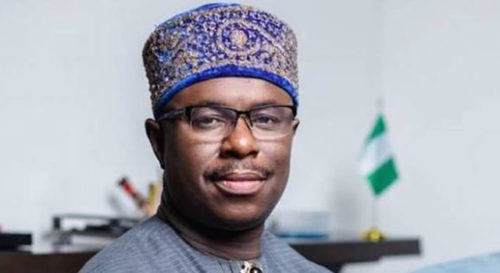
By Shulammite ‘Foyeku
The Nigerian Maritime Administration and Safety Agency (NIMASA) said it plans to end the controversial waiver clause in the nation’s poorly implemented Coastal and Inland Shipping Act 2013, otherwise known as the Cabotage Act.
NIMASA said the move became necessary to end the poor showing on local shipping companies in local maritime trade.
The agency said stopping the waiver in phases will enable indigenous ship owners take charge of the Nigerian coastal trade.
Enacted in 2003, the provisions of the Cabotage Act made it clear that only indigenous ship owners have the mandate to carry out coastal trade and inland shipping.
The Act sets out the limitations on foreign operations of cabotage shipping and the tight conditions under which exceptions can be allowed.
Speaking during a stakeholders’ consultative meeting for cessation of Cabotage waivers in Lagos yesterday, the Director-General of NIMASA, Dr. Dakuku Peterside said the agency was determined to bring to an end the waivers regime, so as to allow cabotage flourish in Nigeria.
“Today is a very special day. For a very long time, indigenous operators that have been very concerned about Cabotage waivers; their concerns coming from the fact that it appears that waivers is now a norm instead of exception and since they have been wondering when are we going to come to the end of this Cabotage waivers regime, I want to say to them NIMASA has ended your cry, NIMASA is on the same page with you. We have decided to bring to an end the waivers regime so that Cabotage will flourish in Nigeria and Nigerians will benefit from coastal trade,” he said.
Dakuku further disclosed that the agency has taken preliminary steps to give Nigerian operators a strong footing in the Cabotage regime.
He said, “Sometimes in 2017, we published marine notice of the new Cabotage compliance strategy and in that marine notice, we informed operators that we shall no longer entertain any form of application for manning waivers save for Captains and Chief Engineers.
“At the time, it was for six months. It was a trial run and we noticed that on six months, we literally double the number of Nigerians onboard vessels by simply publishing and enforcing the new Cabotage compliance strategy.
“Also In 2018, we decided to extend it. After then, we had series of engagement with stakeholders to stop the waivers regime in the Cabotage trade. Today is an important step in that direction.
“As you know, it is the desire of every operator that we end the regime of waivers in the Cabotage trade. And a lot of our people are concerned that we have not been able to build vessels in this country. But at NIMASA, we have taken strategic steps in the area of ship building.
“The country is looking at Ajaokuta Steel Mill again and I believe that once Ajaokuta come on stream, it will remarkably improve our fold in ship building.
“Those engagements are going on. It is even going on at the highest level of government. We are engaging the office of the Vice President to look at the possibility of creating a number of incentives for those who can build vessels in this country and we believe if that is done, a number of persons and entrepreneurs will invest in building vessels in this country.
“We are even working in partnership with the Nigerian Content Development Monitoring Board (NCDMB). To that extent, we have commissioned a survey and audit of all building yards in this country to identify a level of support we can give to enable them come back on stream fully.
“A bigger picture is that in the next five years, we want certain category of vessels to be built in the country so that we will put an end to bring literally all vessels we need from outside the country and create jobs outside the country, whereas we are creating unemployment by patronising foreign built vessels.
“That is strategic step we have taken in the area of owning vessels. We have also taken a number of steps to support local players so that they can own more vessels. We have engaged the Ministry of Finance and Customs to create a special tax regime to Nigerians who will bring in vessels into the country.”